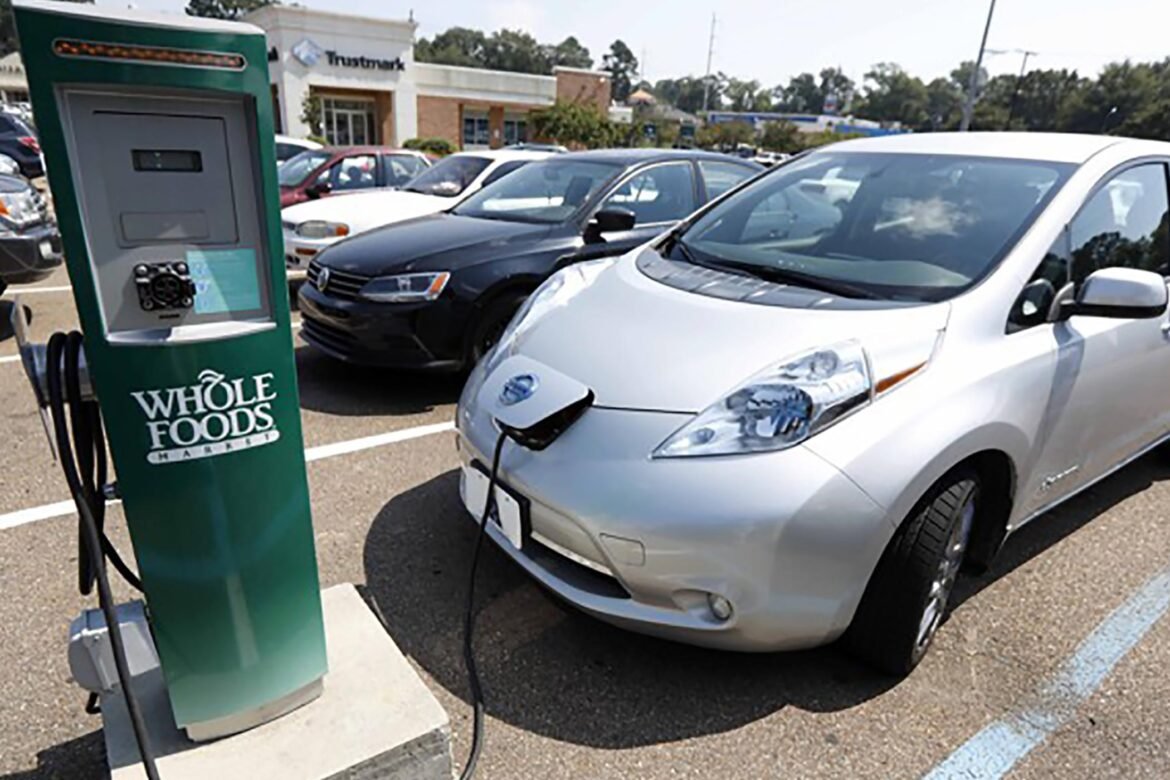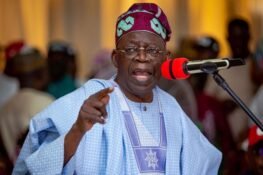Two things propelled my choice of topic. The first was the picture of a big filling station in Jabi, Abuja, dispensing fuel and running other services on solar energy. On the building of the station were solar panels installed and the station had no generating set for alternate power provision to complement the public electricity supply.
A filling station with abundant fuel, that could be considered as cheap and direct source, looking elsewhere to power its activities! And we all go to the same station to procure fuel to power our own generators in our homes! There, it dawned on me, the waning importance of our oil and that we should brace up for the alternatives.
The second event took place at the Red Chambers of the Nigerian National Assembly on Wednesday 17 April 2019, when Senator Ben Murray Bruce brought the issue of electric cars to our national consciousness by attempting to get a bill, the Electric Cars (Introduction ) Bill 2019, SB. 726, passed.
The bill which focused on phasing out Petrol vehicles and introducing electric cars by 2035 was soundly defeated.
The “common sense” senator was made to withdraw the bill following observation by his colleagues that it is practically impossible to force cessation of the use of internal combustible engine vehicles. His colleagues reminded him that Nigeria is a major oil producer and that the introduction of the electric car would hurt our economy greatly.
The then Deputy Senate President, Senator Ike Ekweremadu succinctly added that, “Besides, in economic sense, we are an oil producing country. So, we should do everything possible to frustrate the sale of electric cars in Nigeria to enable us to sell our oil.”
Hmmm! Reminder on the effects of mono economy. So, based on our oil economy, we pray the green cars should not come yet However, the electric cars are here already. Is our total dependence on oil and the fear of losing income from oil production due to the emergence of electric vehicles well placed? Will the crude oil in Nigeria last forever?
Nigeria and Oil
The first oil well was drilled in the present Bayelsa state in 1956. By the size of reserves, Nigeria is the tenth most petroleum-rich nation. Nigeria holds Africa’s largest reserves with a total of 159 oil fields and 1481 wells in operation. Nigeria has six petroleum export terminals. It’s oil reserves are now estimated at 37bn barrels .
The Oil and gas sector accounts for about 10 per cent of gross domestic product, and petroleum exports revenue represents about 86 per cent of total exports revenue in Nigeria.
Nigerian crude oil exports records about 2.2 million barrels per day. This generates a huge income for the country. Between 1999 and 2013 for example, Oil and Gas flows to Federation total revenue was $509.02bn. Revenue from the oil industry accounts for almost 75% of the budget.
With this background, consider this big news! Nigeria’s oil reserves are now estimated at 37bn barrels, and based on projections, with a daily production of 2m barrels, Nigeria’s oil will run out in about 46 years! Our oil reserves were predicted to last 110 years.
Let us hope, we discover more oil, but will the importance of oil in energy circles remain the same? Not really. The world is going for cleaner and cheaper energy sources.
The Era of Electric Vehicles
The Electric Vehicle (EV) is designed to use one or more electric motors or traction motors for propulsion. EVs are powered through electrical sources that could be off-vehicle, or self -contained with re-chargeable batteries. EVs are now common in road, rail, maritime (vessels) and air (aircraft and spacecraft) modes of transportation.
EV dates back to 1827 when an Hungarian Priest, Anyos Jedik pioneered the experience. Several inventors and automobile companies later came into the scene to improve on the EVs. Over the years, there have been great injections of EVs into the automotive industry, with renewed interest in the last few decades.
Plug-in electric vehicles have become very popular in many parts of the world. Global EV Outlook (2019) disclosed that, in “2018, the global electric car fleet exceeded 5.1 million, up 2 million from the previous year and almost doubling the number of new electric car sales. The People’s Republic of China remains the world’s largest electric car market, followed by countries in Europe, and the United States.”
International Energy Agency (2018), also revealed that the sale of electric cars may rise by 24 per cent yearly till 2030.
The Agency estimated that the number of electric passenger cars and light commercial vehicles could reach 125 million by 2030, on the basis of existing and announced policies, and there is potential to reach 228 million if governments increase their ambitions in line with international climate change goals.
CBINSIGHTS (2019) also projected that EVs will increase from 2% of global share in 2016 to 22% in 2030.
Though there are some EVs in Nigeria, the number is still very few. Although, certain efforts are being made to produce EVs by some groups including universities and some private investors who have shown intention to partner with international groups to produce EVs in Nigeria, we are yet to have the Nigeria EVs in the market.
The popularity of electric cars is also still very low. Africa in general and Nigeria in particular are yet to really key into the EV. This is inappropriate.
I had better insight into the EV arrangement during a facility/factory tour of Volvo Cars in Gothenburg, Sweden on the 16th of October, 2009. I had gone to the Volvo Cars Visitor Centre, located in Torsland, Gothenburg, in company with some other participants of the CITADEL International Motor Vehicle Inspection Committee, 2009 Conference & 14th General Assembly, between 13 and 14 October. 2009. The Volvo factory, located on Hisingen, Sweden’s fourth largest Island, produced over a thousand cars daily.
During the interactive sessions and exhibitions, the topics of climate changes, the greenhouse effect and carbon dioxide emissions were discussed. We all appreciated that extensive research had gone into developing new environmentally friendly fuels, such as Bio-fuels.
It was also revealed that a future electric car was in the making. It was revealed that by 2012, a Volvo Plug-in-Hybrid car, an electric car running on lithium low battery 12KWh energy would be produced for the European market.
The car was to run on a dual energy system, an hybrid. You can conveniently switch from electricity to gasoline fuel and vice versa. (Olagunju, 2011). Don’t you think the new eco friendly bio-fuels are threats to the crude oil that is making us not to embrace electric vehicles? We should not be left behind in this global shift .
Why do we need to embrace Electric Vehicles now?
The benefits accruable are many. The UK House of Commons In 2018 captures the major benefits thus:
“Electric vehicles (EVs) represent exciting opportunities for the UK: as a technology to reduce greenhouse gas emissions from our largest-emitting sector; as a tool to reduce local air pollution, the second-highest cause of avoidable mortality in the country; and as a new industry with substantial export opportunities”
Nigeria needs to key into the opportunity to reduce the Greenhouse gas (GHG) emissions in line with the Paris Agreements (United Nations Framework Convention on Climate Change). We have to make conscious efforts to reduce the number of the Internal Combustion Engine (ICE) Vehicles and replace them with Electric Vehicles.
Nigeria is committed through the Nationally Determined Contribution (NDC) to reduce GHG emissions by 20% unconditionally, and up to 45% with international support. EVs are eco-friendly and will assist in meeting our national de-carbonisation targets.
A huge sum, in the realm of one trillion Naira is spent on fuel subsidies by the Nigerian Government annually. A gradual shift from ICE vehicles to EVs will help in freeing a lot of this fund for developmental purposes. It is also noteworthy that some countries have set targets for the stoppage of sales of new gasoline and diesel cars. These include Britain (2040); France (2040), India (2030) and Norway (2025).
Other countries on the list of countries with official targets for electric car sales are China, Austria, Denmark, Ireland, Japan, the Netherlands, Portugal, Korea and Spain. Automotive companies are also setting self targets. Efforts should be made to avoid making Nigeria a dumping grounds for phased out fossil-fuelled vehicles with the attendant environmental, safety and other consequences.
Electric cars are actually more economical in operations and maintenance. Owelle (2018) revealed that it takes less than N300 (Three Hundred Naira) to recharge a vehicle for range of 500km compared to over N4,000 (Four Thousand Naira) with petrol or diesel. Also, there are no moving engine parts to repair in electric vehicles, thus eliminating expensive maintenance/ mechanic bills.
Nigeria is blessed with abundant sunshine which will aid in solar powered charging of the renewable energy sources for the EVs . The advent of electric vehicles will also bring in new businesses and jobs. Just like ICT led to creation of new opportunities, the introduction of the electric cars will introduce new skill sets with additional windows of opportunity opened to help reduce unemployment rates in the country.
What are the fears?
The major fear on the introduction of electric vehicles as a nation bothers on the oil revenue and our economy. This lies on the premise that the bulk of our earnings come from the sales of oil and it would be foolhardy to bring in projects or schemes that will affect our sales and subsequently bring hardships with shortage of revenue to fuel our economy?
But is it really over for the oil as we promote electric cars? Not really. EIA (2019) forecasts that global oil consumption will average 101.45 million barrels per day in 2019 and 102.93 million b/d in 2020. The consumption is approximately 80% crude oil and 20% natural gas liquids. It is also worthy of note that about 55% of the crude oil, according to EIA is for transportation while 35% is for industrial use and the reminder in other categories such as electricity.
Bauer (2019) stated that global oil demand is forecast to stall within the next decade and the rise of EVs may accelerate the decreased demand. IHS (2018) estimated that a third of global oil demand is from cars.
These probably reinforce the fear for fall of oil demands. The IHS estimation that the increased demand for EVs as opposed gasoline powered autos may reduce oil consumption by only about 5 million b/d or 5% of the daily production makes the effect minimal. In 2017-2018 for example, the EVs displaced only about 50,000 barrels of the 100 million per day global demand.
The situation is appropriately captured by Welch (2018).
Although electric vehicles (EVs) are making headlines, they are not yet a market force to replace the internal combustion engines that power today’s automotive fleets, so oil demand is currently growing strong. Although EVs undoubtedly have the potential to disrupt the energy and automotive sectors in the longer term, they currently make up around 1.5 percent to 2 percent of total global vehicle sales, and account for less than 0.5 percent of the global vehicle fleet; so their influence on the oil market, in the short term, is limited.
—Spencer Welch, director, head of global short-term refining research at IHS Markit
Eberhart (2018) is also of the view that the increasing popularity of the electric Vehicles is not a death knell for the oil as both the ICE and electric vehicles will co-exist. He posits that:
Proponents of electric vehicles writing the oil industry’s obituary should put down their pens. There’s no denying that electric cars will significantly change the transportation landscape in the coming decades, but the transformation will be gradual and poses no “clear and present” danger to global oil demand through mid-century.
He envisaged that even under the rosiest forecast for electric vehicles, oil demand will remain robust through the mid-century.
Eberhart noted that UK oil major BP modelling shows that even a worldwide ban on new internal combustion engine vehicles would only create a 10 million barrels a day dent in global oil demand by 2040. So, Nigeria needs not entertain any fear on the effect on oil and embrace EVs. Major oil players are also investing in EVs and related infrastructure.
Another fear is that of the price. That the EVs are more expensive than the ICE vehicles. UK House of Commons (2018) addressed this fear in a report where it observed that international market trends suggest that electric cars and vans will reach price equivalency with internal combustion engine (ICE) vehicles by the mid-2020s, and that EV sales will overtake petrol and diesel sales by the late 2030s. So, Nigerians should expect the price to come down.
Range Anxiety and Charging Infrastructure also propel major fears. This is the concern that the EVs may not have enough charge to complete a journey, especially on long distance trips and that the charging points may not be readily available.
These fears are already being addressed as there are hybrid vehicles which can be switched from gasoline to electricity and vice versa. Improved designs have also led to longer energy life while ultra-vast charging infrastructure are now available. We only need to invest in these, as a country.
Lack of Skill set is also a concern. Presently, Nigeria does not have enough workers that could handle the repairs and generally manage EVs. This is surmountable.
What are we to do?
The first step is to embrace EVs as a country and eliminate the thought that it will be suicidal to join the global moves for electric Vehicles as an oil producing nation. As earlier posited, the effect on the oil demand is still minimal and even on a long term, it can not be compared with the benefits.
The ICE and EVs will co-exist for many decades while hybrid vehicles will still use gasoline. There are also other needs for our crude both locally and internationally. Other modes of transportation will still require our oil, while industrial and other needs for example electricity (what an irony?) will still increase.
Even major global oil players are keying into the EV revolution. If we want to maintain our relevance in African and global economy the country should join the global trends.
The National Automotive Design and Development Council (NADDC) should spearhead the plans on EVs in Nigeria. The Council should partner universities, research institutes and other stakeholders on research and other efforts that will lead to the emergence and successful integration of Nigeria EVs.
The Council should also partner with manufacturers both locally and internationally as Nigeria joins the train.
Universities and other educational institutions should not only engage in research but also in the development of skill sets required in the management of the EVs. Technical institutions should help in training mechanics and relevant professionals with the right skills for the EVs management.
There should be Public-Private-Partnership in the manufacture of EVs in the Country. Let us encourage our private sector to invest in EVs. Let us mandate our automotive companies to explore it. We can actually give a deadline for the production with adequate governmental support.
Provision of Infrastructure like Charging Stations/Points should be vigorously pursued. Filling station operators should be encouraged to have EV charging points provided in all their stations.
Other interest groups should also be encouraged to participate while government should invest in public charging points. In 2018, the world’s first electrified road that recharges the batteries of cars and trucks driving on it was opened in Sweden.
The 2km road in Stockholm has a system to calculate the vehicle energy consumption and bill the owner appropriately. Nigeria should join other nations in developing infrastructure and exploring opportunities inherent in the use of EVs.
Let us also tap into the abundance of sunshine here in developing the charging infrastructure. The solar system should be explored. The country should also improve on power generation and distribution.
This will aid production of the EVs and related infrastructure. That will assist in making the prices affordable. Grants and Tax Incentives should be introduced by the government to promote EVs. Manufacturers of EVs as well as importers should have preferential vehicle excise duty rates and other incentives.
Grants such as research and innovation grants could also be made available to those involved in the evolution of the EVs. We should also look into our laws and regulations, amend and adopt international best practices suitable for our local environment on the production, sales and use of EVs in the country.
Conclusion
Nigeria should join the global community in adopting the use of electric vehicles. It’s time to start investing. The reality is that the impact on the oil presently and even in decades to come is minimal and we should not use our oil producing status as an excuse not to join the global train.
There will always be demand for our oil even in transportation as the ICE and EVs will still coexist for a long time and there will still be demands for oil in industrial and other sectors.
Embracing EVs should even be seen as part of our diversification efforts as there are huge benefits to neutralise the minimal loses, if any from oil revenue.
Nigeria should avoid becoming a dumping ground for phased-out ICE vehicles because of the environmental, safety and other consequences. Electric Vehicles are here. Let us embrace now.
An Address by ACM Kayode OLAGUNJU, PhD, FCILT, mni, Assistant Corps Marshal, Federal Road Safety Corps, Nigeria at the Club Project Luncheon and Investiture of 2nd Club President of Rotary Club of Epe Metropolitan District 9110, Nigeria on the 31 August 2019.








